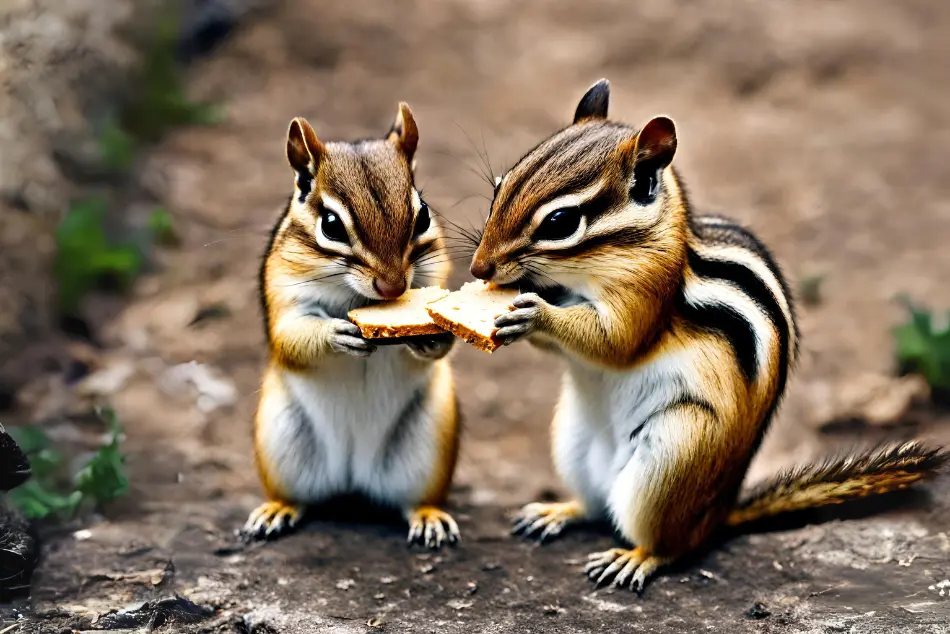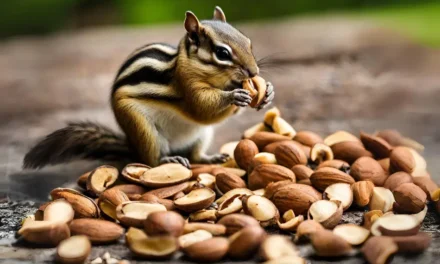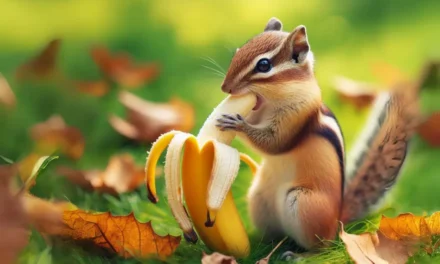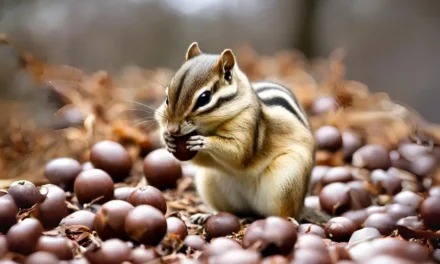Chipmunks, those adorable little creatures scurrying through gardens and forests, often evoke curiosity about their dietary habits. “Can chipmunks eat bread?” is a common query among many animal enthusiasts.
Understanding these small mammals’ dietary preferences is crucial for their well-being when they visit our outdoor spaces or interact with us. Let’s delve into the world of chipmunks, exploring their food habits, their love for nuts, seeds, and fruits, and decipher whether bread is a suitable addition to their diet.
Chipmunks, scientifically known as Tamias, belong to the squirrel family, Sciuridae. These tiny, striped creatures are primarily herbivores, primarily consuming seeds, nuts, fruits, and occasionally insects.
Their foraging habits are fascinating, and observing them darting around collecting food can be a delightful experience. But the big question remains: Can they indulge in bread like their larger squirrel relatives?
To understand the intricacies of a chipmunk’s diet, it’s crucial to comprehend their natural habitat and the typical foods they consume. Picture a serene woodland area adorned with vibrant foliage and scattered nuts and seeds. Here, chipmunks thrive on a diverse diet of nuts like acorns, hazelnuts, and beechnuts, relishing the energy-dense content these provide. Their natural instinct drives them to gather and hoard food for the winter months, emphasizing the significance of a nutritionally balanced diet.
What foods are bad for chipmunks?
Avoid feeding chipmunks fruits like peaches and plums with seeds, as they contain toxins. Instead, opt for stone-free versions. Also, steer clear of seed-based rodent diets, which aren’t suitable for chipmunks. While pellets designed for rats and mice can be fed to chipmunks, avoid seed-based options altogether.
What is a chipmunk’s favorite food?
Chipmunks display a clear preference for nuts, seeds, and fruits. They meticulously collect and store these items in their cheek pouches, ensuring a steady supply of food for survival.
1. Nuts
Nuts constitute a significant portion of a chipmunk’s diet. These small mammals possess cheek pouches that allow them to gather and transport food efficiently. They collect various nuts, storing them in their burrows or designated hiding spots.
Acorns, rich in essential nutrients, are a chipmunk’s delight. Similarly, hazelnuts and beechnuts are also among their preferred treats. These nuts not only provide sustenance but also serve as vital energy sources during periods of scarcity.
2. Fruits
While nuts are a staple, chipmunks also relish a variety of fruits. Berries, cherries, and other soft fruits often find a place in their diet. These fruits offer a refreshing change, complementing the nuts and seeds with their natural sweetness.
For instance, imagine a chipmunk scampering across a berry-laden bush, nibbling on ripe, juicy berries – a scene that highlights their fondness for these delectable treats.
3. Seeds
Seeds form an integral part of a chipmunk’s dietary intake. Their diet isn’t solely restricted to larger nuts; they also consume smaller seeds like sunflower seeds and pumpkin seeds. These seeds not only contribute to their nutritional needs but also provide variety in taste and texture.
Why you shouldn’t feed chipmunks?
Feeding chipmunks might seem like a friendly gesture, but it’s actually harmful to their health. Wild animals, including chipmunks, have specific dietary needs that are different from what humans eat. Offering them human food can lead to malnutrition or even death because it doesn’t provide the nutrients they require to thrive.
Moreover, wild animals can’t tell the difference between food and packaging materials like wrappers or foil. Ingesting these items can make them sick, further endangering their well-being. So, it’s best to admire chipmunks from a distance and let them find their own natural sources of food. By respecting their dietary needs and habitat, we can help ensure their survival in the wild.
Can Chipmunks Eat Bread? Exploring the Controversy
Yes, technically they can nibble on it if they find it. But is it good for them? Not quite. Here’s why:
Chipmunks are natural-born snackers, munching on seeds, nuts, fruits, and insects. Bread lacks the essential nutrients they need and is packed with ingredients like refined flour, sugar, and preservatives that don’t do them any favors.
Bread’s heavy carbs and additives can be hard for a chipmunk’s tummy to handle. Think tummy troubles, bloating, and even potential malnutrition if they rely on bread too much.
Instead of bread, offer chipmunks the good stuff! They’ll love sunflower seeds, pumpkin seeds, dried berries, apples, and even mealworms. These yummy bites pack the protein, vitamins, and fiber they need to thrive.
Facts:
- Bread can mold quickly, and mold is toxic to chipmunks. So, if you do offer bread, ensure it’s fresh and gone in a flash.
- Bread crumbs can attract other critters like raccoons or squirrels, turning your backyard into a furry free-for-all you may not want.
- Even if you offer bread, most chipmunks will stick to their natural favorites. Their instincts know what’s best for their tiny bodies.
Chipmunks, like many wild animals, thrive on foods found in their natural habitats. Providing them with suitable alternatives that mimic their natural diet ensures their well-being. While a tiny piece of bread might not cause immediate harm, it’s best to offer them foods they’d typically find in the wild.
As responsible stewards of outdoor spaces where chipmunks roam, offering them foods compatible with their natural diet becomes an act of care and respect for these charming creatures.
Consuming too much bread can lead to various health issues, so understanding the symptoms, diagnosis, and treatment is crucial for responsible wildlife observation or care.
Symptoms:
- Digestive Problems:
- Diarrhea
- Constipation
- Gas and bloating
- Reduced appetite
- Lethargy
- Nutrition Deficiencies:
- Weight loss
- Dull fur
- Skin problems
- Weakness
- Difficulty foraging
- Other Potential Issues:
- Choking from large pieces of bread
- Mold poisoning from stale or moldy bread
- Increased dependence on human food sources
Diagnosis:
Unfortunately, diagnosing bread-related issues in chipmunks can be challenging due to their natural skittishness and lack of veterinary resources. Observing the symptoms mentioned above alongside the presence of bread crumbs in their habitat can provide clues. Veterinarians specializing in wildlife rehabilitation may be able to perform examinations in rare cases.
Treatment:
Treatment for bread-related problems in chipmunks primarily focuses on supportive care and preventing further harm:
- Remove access to bread: Ensure no more bread is available in the chipmunk’s habitat.
- Offer healthy alternatives: Provide natural foods like nuts, seeds, fruits, and insects to encourage a balanced diet.
- Monitor closely: Observe the chipmunk for any worsening symptoms or improvement.
- Seek professional help: If symptoms are severe or persist, consult a wildlife rehabilitation specialist. They can provide additional support like hydration, nutritional supplements, and parasite control.
Prevention:
The best way to avoid health issues in chipmunks is to prevent them from eating bread in the first place. Here are some tips:
- Dispose of food scraps properly: Secure trash cans and compost bins.
- Clean up spills: Avoid leaving crumbs or leftover food outdoors.
- Educate others: Raise awareness about the dangers of feeding wildlife human food.
Does baking soda harm chipmunks?
It’s common to wonder if baking soda can deter chipmunks from invading your space. However, this belief is simply a myth. Chipmunks aren’t deterred by baking soda and will continue to roam your garden regardless of how much you sprinkle around.
Understanding Chipmunks’ Diet
Chipmunks, small members of the squirrel family, have a diverse diet primarily consisting of nuts, seeds, fruits, and occasionally insects. These tiny creatures are meticulous foragers, gathering and hoarding food to sustain them through periods of scarcity.
Natural Diet of Chipmunks
In their natural habitats, chipmunks thrive on a diet rich in nuts like acorns, hazelnuts, and beechnuts. These energy-dense nuts provide essential nutrients and serve as a crucial component of their diet.
Bread as a Food Option for Chipmunks
While chipmunks may nibble on bread if available, it doesn’t align with their natural diet. Bread, being a processed food with additives and refined flour, isn’t the healthiest choice for these creatures.
Nutritional Value of Bread for Chipmunks
Bread lacks the essential nutrients that chipmunks require for optimal health. Its composition doesn’t match the nutritional content found in their natural diet.

How long do chipmunks live in the wild?
Chipmunks lead relatively short lives in the wild. They typically leave their parents’ den at around eight weeks old and reach sexual maturity by the time they’re one year old. In the wild, chipmunks can live up to two years, although some have been known to survive for up to eight years in captivity.
Possible Risks of Feeding Bread to Chipmunks
Feeding bread to chipmunks may lead to digestive issues or nutrient imbalances due to its processed nature. While small amounts might not cause immediate harm, it’s best to avoid it as a regular food source.
Alternative Food Options for Chipmunks
Optimal alternatives for chipmunks include nuts, seeds, and fruits found in their natural habitats. These foods provide the necessary nutrients for their well-being.
Fruits and Vegetables for Chipmunks
Chipmunks enjoy a variety of fruits such as berries, cherries, and other soft fruits. However, they might not readily consume vegetables compared to fruits and nuts.
Nutritional Information (Per 50 grams) Chipmunk
| Nutrient | Amount |
|---|---|
| Calories | 93 |
| Protein | 7.2g |
| Fat | 4.5g |
| Carbohydrates | 5.6g |
| Fiber | 0.9g |
| Sugar | 0.4g |
| Calcium | 44.5mg |
| Iron | 1.8mg |
| Magnesium | 22.6mg |
| Phosphorus | 117mg |
| Potassium | 169.5mg |
| Sodium | 101.5mg |
| Zinc | 1.2mg |
| Vitamin C | 0mg |
| Vitamin B6 | 0.1mg |
| Vitamin B12 | 0.3mcg |
| Vitamin D | 0IU |
| Vitamin E | 0.6mg |
| Vitamin K | 1.1mcg |
| Folate | 4.7mcg |
| Niacin | 1.5mg |
| Riboflavin | 0.2mg |
| Thiamin | 0.1mg |
| Choline | 34.5mg |
Is it GOOD to feed wild chipmunks?
Feeding backyard birds, squirrels, and chipmunks is a common practice for many people, and it’s generally considered acceptable. However, there are differing opinions on this matter. While some argue that providing food for these animals doesn’t harm them, others believe it can disrupt their natural behaviors and poses risks to both the animals and humans involved.
The National Park Service advises against feeding wild animals, stating that it can interfere with their normal routines and potentially lead to dangerous encounters with humans. Critics of feeding wild chipmunks and other creatures emphasize the importance of allowing them to forage for food naturally, without human intervention.
Experts such as Tayyaba Arshad, Ali Raza, DVM; Laurie Hess, DVM; and Rick Axelson, DVM, specialize in animal care and offer insights into the potential consequences of feeding wild animals. They caution that while it may seem harmless, feeding these creatures could have unintended consequences for their health and behavior.
What Should Not Be Fed to Chipmunk
Chipmunks, like many small animals, have specific dietary needs and there are certain foods that should be avoided to keep them healthy. Here’s a list of foods that should not be fed to chipmunks:
- Processed Foods: Chipmunks should not be given processed or junk foods like chips, candy, or cookies as these items can be harmful to their health and provide little to no nutritional value.
- Sugary Foods: Avoid feeding chipmunks sugary treats such as chocolate, sugary cereals, or sweets. These can lead to obesity, dental problems, and other health issues.
- High-Fat Foods: While chipmunks do require some fat in their diet, high-fat foods like fried foods, fatty meats, or oily snacks should be avoided as they can lead to digestive problems and obesity.
- Dairy Products: Chipmunks are lactose intolerant and should not be given dairy products like milk, cheese, or yogurt as they can cause gastrointestinal discomfort and diarrhea.
- Processed Meats: Foods like bacon, sausage, or deli meats are too high in salt and fat for chipmunks and can lead to health problems such as heart disease and obesity.
- Raw Beans and Grains: Raw beans and grains contain compounds that can be toxic to chipmunks if not properly prepared. Always ensure that beans and grains are cooked thoroughly before offering them to chipmunks.
- Onions and Garlic: Onions and garlic contain compounds that can be toxic to chipmunks and should be avoided.
- Citrus Fruits: Chipmunks may not tolerate the acidity found in citrus fruits very well and may experience digestive upset if fed these fruits.
- Alcohol: Just like with any other animal, alcohol is toxic t
Do chipmunks come out at night?
Chipmunks are known to be active during the day, making them diurnal creatures. This means they are most active in daylight hours and typically rest during the night.
Is Bread Harmful to Chipmunks in the Same Way?
Bread poses similar risks to chipmunks as it does to other wildlife. Its processed nature, additives, and lack of nutritional value make it an unsuitable choice for their diet. While small amounts might not cause immediate harm, it’s best to avoid regularly feeding bread to chipmunks.

Can Chipmunks Consume Carrots?
Chipmunks are known to primarily favor nuts, seeds, and fruits over vegetables. While they may nibble on carrots if available, they might not actively seek out or consume them as part of their regular diet.
Do chipmunks like coffee grounds?
Chipmunks aren’t particularly fond of coffee grounds, making them a handy, natural repellent for your garden. Coffee grounds serve as a cost-effective and eco-friendly method to deter these critters while also enriching the soil. One simple technique is to scatter coffee grounds along the periphery of your garden or garden beds.
Do chipmunks get attached to humans?
Chipmunks can indeed form bonds with humans, especially in environments like parks where they become accustomed to people. They display a curious behavior of climbing onto humans in search of nuts, learning that their docile demeanor often results in treats.
How do you make chipmunks happy?
To ensure the happiness of chipmunks, particularly in the fall season, one can collect fallen acorns and nuts and place them in platform feeders, catering to their instinctive hoarding behavior. Providing water is also crucial for their well-being, either through ground-level sources or by setting up pedestal birdbaths that they can access by climbing.
Conclusion:
In the realm of chipmunk diets, nuts, fruits, and seeds reign supreme. While the occasional nibble on bread might not harm them significantly, it’s essential to prioritize their health by providing foods that align with their natural dietary preferences. Observing chipmunks in their natural habitat, foraging for nuts or enjoying ripe fruits, offers a glimpse into their world, reinforcing the importance of catering to their nutritional needs in a manner that respects their natural instincts.
As we coexist with these delightful creatures, let’s ensure their dietary needs are met in ways that sustain and support their well-being amidst our shared spaces. Understanding what chipmunks eat helps us foster a harmonious environment, allowing these small beings to thrive as nature intended.
Remember, when in doubt about what to feed these furry friends, sticking to their natural diet is always the best approach!
Throughout this exploration of chipmunk diets and the bread debate, it’s evident that these creatures thrive on a diet rich in nuts, fruits, and seeds. Understanding their preferences not only aids in their well-being but also fosters a deeper connection with these fascinating animals that share our living spaces.
Related Topic References:
FAQS- Can chipmunks eat bread
What do chipmunks eat in the wild?
In their natural habitat, chipmunks primarily consume nuts, seeds, and fruits, supplementing their diet with occasional insects.
Is feeding chipmunks bread harmful?
While small amounts might not cause immediate harm, regularly feeding bread to chipmunks can lead to digestive issues due to its processed nature.
Do chipmunks eat vegetables?
Chipmunks tend to favor nuts, seeds, and fruits over vegetables, although they might sample softer vegetables like carrots occasionally.
What should I feed a wild chipmunk?
Offering nuts, seeds, and fruits found in their natural surroundings is best for maintaining a wild chipmunk’s nutritional needs.
Can chipmunks eat nuts other than acorns?
Yes, chipmunks enjoy a variety of nuts such as hazelnuts, beechnuts, and others they can gather in their habitats.
Are fruits a significant part of a chipmunk’s diet?
Fruits like berries, cherries, and other soft fruits are indeed part of a chipmunk’s diet, providing them with a refreshing change.
Will chipmunks eat bread crumbs?
Chipmunks nibble on bread crumbs if they encounter them, but it’s not a preferred or nutritious food choice for them.
It’s also important to understand what you should feed a wild chipmunk
Understanding what to feed a wild chipmunk is crucial. When offering meals to chipmunks, it’s essential to provide a balanced diet. They enjoy a variety of foods, including nuts, seeds, cereals, fruits, and vegetables. However, it’s important to limit high-calorie foods like sunflower seeds and peanuts to prevent overeating and potential health issues.
What kinds of veggies do chipmunks consume?
Chipmunks include a diverse range of fruits and vegetables in their diet. They are particularly fond of ground-growing berries like strawberries and blackberries. Additionally, they consume vegetables and grains similar to those commonly eaten by humans, such as squash and corn.

![Can Chipmunks Eat Bread [Answered By Expert]](https://rodentpeteat.com/wp-content/uploads/2023/12/Can-Chipmunks-Eat-Bread.webp)



